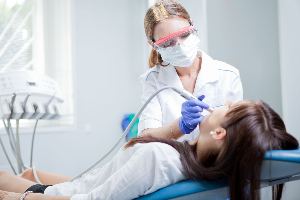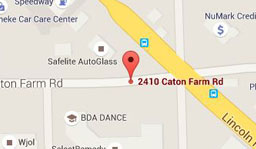Maximize Your Dental Cleanings
 You know the importance of regularly scheduled dental cleanings. As an adult, you may even have a fairly established routine for the day of your appointments. You may feel tempted to go into the office, have the cleaning performed, and go home without thinking about the event any further.
You know the importance of regularly scheduled dental cleanings. As an adult, you may even have a fairly established routine for the day of your appointments. You may feel tempted to go into the office, have the cleaning performed, and go home without thinking about the event any further.
However, your routine dental cleanings are an important part of keeping your smile healthy. The next time you have a cleaning scheduled, use the measures outlined below to ensure that you benefit as much as possible from your visit.
Schedule Regular Appointments
Routine dental cleanings are designed to help you maintain your best possible oral health. These exams and cleanings work most effectively when they take place at least twice a year. Schedule your cleanings bi-annually or quarterly, according to your dentist’s recommendations.
If you know enough about your future schedule, make your next appointment when you finish a cleaning. This step ensures that you don’t forget or push off your next cleaning when the time comes.
Consider Other Helpful Procedures
In addition to X-ray imaging, a physical examination, and a cleaning, you have the option to schedule other services at the time of your routine visit. For example, many dentists offer tooth polishing and fluoride administration as well.
You may even be able to schedule any fillings or other restorative work at the same time as the primary appointment. This option eliminates the need for a second appointment while ensuring that you receive the dental care you need.
This step can be particularly helpful for younger patients who have to miss school for their appointments or patients who must miss work to see the dentist.
Take Note of Any Irregularities
In between your usual appointments, pay attention to the way your smile looks and feels. If you notice any minor irregularities, bring them up with your dentist during the upcoming appointment. This type of change may include greater tooth sensitivity, a newly discolored area, or mild gum discomfort.
Remember, if you notice acute pain or changes to the physical structure of your teeth, you should consider these issues a dental emergency and seek care right away.
Bring Any Changed Insurance Information
A lot can happen in six months. If you’ve started a new job, switched insurance carriers, or had your plan changed by your insurance company, the insurance on file at your dentist’s office may no longer be up to date.
Bring your current insurance information to every appointment. If you know your coverage has changed since your last visit, let the reception staff know so they can update your records. This step ensures that you never go into a cleaning not knowing your financial options.
Make a List of Your New Medications
The medication you take can have a distinct impact on the condition of your mouth. Additionally, certain medications disqualify you from specific dental procedures. In order to provide you with the best possible care, your dentist needs to know the types of medication and the dosage you take.
To make it easier to remember your medication information, you may want to make a physical list that you can give to the reception staff or a hygienist. These staff members will then update your patient file and inform your dentist of any relevant changes to your oral health needs.
Ask Your Dentist Any Questions You Have
Think of your routine cleaning visits as the oral health version of a physical. This appointment is your opportunity to straighten out any concerns you have about your oral health or hygiene. Your hygienist may be able to answer most of your questions, but you can also wait to talk to your dentist if you feel more comfortable with his or her expertise.
It’s particularly important to ask questions that you have about how you care for your teeth at home. For example, if you feel like traditional flossing doesn’t seem to do enough for your teeth, ask how you can improve. Your dentist may recommend a different technique or even an alternative flossing tool to get the job done.
Consider Adding Recommended Products to Your At-Home Routine
When you’re ready to improve your at-home oral hygiene routine, ask for recommendations from your dentist. Your dentist can consider your oral health history and cleaning habits to give you suggestions that would be most beneficial to you.
For example, in our hypothetical situation from the previous section, your dentist might recommend switching to handheld flossers or even a water flossing tool to make your flossing efforts more effective.
Other recommendations your dentist may have could include clinical grade or prescription toothpaste, a high-quality toothbrush, or mouthwash formulated for your specific needs like a fluoridated variety to account for a fluoride deficiency.
Use these guidelines to improve your experience during your routine dental cleanings as well as your oral health in between appointments.

